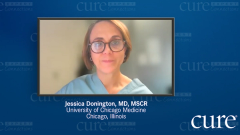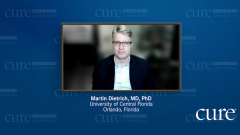
Talking to Early Non-Small Cell Lung Cancer Patients About Adjuvant Therapy
Jessica Donington, MD, MSCR, describes how she discusses adjuvant therapy with patients diagnosed with early non-small cell lung cancer.
Episodes in this series

Jessica Donington, M.D., MSCR: I absolutely agree, for some cancers, thinking of adjuvant therapy is right at the front. When you think of breast cancer, almost every patient, except those who have small tumors, expect to get some kind of systemic therapy. We haven’t been there with lung cancer, but I think we’re going there. I want all my patients to always be ready for that conversation. I talk about this with my patients preoperatively. I also go out of my way to talk to my families about it. When we are talking to patients around surgery, it all comes fast and furious. There’s a lot of information that happens all at once, and it can get muddled in people’s minds. I go out of my way to not only engage my patients, but their families and caregivers. Because often, we want to start these treatments within three months of surgery, and sometimes patients are still feeling kind of lousy. They don’t feel like themselves yet. They’re still tired, they’re still kind of, “well....” I see it all the time where the patients are hesitant, and I must have the families and the caregivers on board, because they sometimes have to drive that ship a little. If patients drag their feet and don’t go see the oncologist until it’s almost two months out, it starts to get to be too late.
We want all of this to happen rapidly. I do my best to engage everybody, again, before surgery, and then right at my first postoperative visit, we go over the pathology in depth and tell them right then and there, “You’re going to need chemotherapy, or you’re not going to need it, and these are the reasons.” When I’m talking to my patients about chemotherapy or not, their first question is always, “Did you get it all?” I’m like, “I got what I could see.” But again, that’s not the goal of adjuvant therapy. It’s to kill the cells we can’t see. Then they always have questions about things like, “Will my hair fall out?” I think that’s the most common question with every oncologist. We should all have a sign that says, “Your hair will not fall out.” Although it’s definitely going to get thin with lung cancer chemotherapy. After that people always want to know about how long, how they will feel? Luckily, most of that stuff we really know quite well. It doesn’t go on forever. The really intense stuff only goes on for three months, and then anything that we recommend after that three months tends to be much more spread out and not as intense. You’re moving into the marathon portion of the treatment and coming out of the sprint.
I always encourage my patients and my families to be asking questions up front. There’s nothing off the table. And if I can’t answer a question for them before surgery, then we can have them see the medical oncologist before or after. Anything to get people comfortable with the concept and the importance of undergoing therapy for advanced and locally advanced disease.
Transcript edited for clarity.






